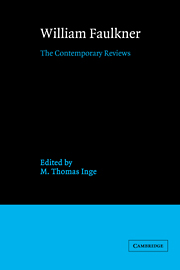Book contents
- Frontmatter
- Contents
- Series Editor's Preface
- Introduction
- Acknowledgments
- The Marble Faun (1924)
- Soldiers' Pay (1926)
- Mosquitoes (1927)
- Sartoris (1929)
- The Sound and the Fury (1929)
- As I Lay Dying (1930)
- Sanctuary (1931)
- These Thirteen (1931)
- Salmagundi and Miss Zilphia Gant (1932)
- Light in August (1932)
- A Green Bough (1933)
- Doctor Martino and Other Stories (1934)
- Pylon (1935)
- Absalom, Absalom! (1936)
- The Unvanquished (1938)
- The Wild Palms (1939)
- The Hamlet (1940)
- Go Down, Moses and Other Stories (1942)
- The Portable Faulkner (1946)
- Intruder in the Dust (1948)
- Knight's Gambit (1949)
- Collected Stories (1950)
- Notes on a Horsethief (1950)
- Requiem for a Nun (1951)
- Mirrors of Chartres Street (1954)
- The Faulkner Reader (1954)
- A Fable (1954)
- Big Woods (1955)
- The Town (1957)
- New Orleans Sketches (1958)
- Three Famous Short Novels (1958)
- The Mansion (1959)
- The Reivers (1962)
- Index
Sartoris (1929)
Published online by Cambridge University Press: 07 September 2009
- Frontmatter
- Contents
- Series Editor's Preface
- Introduction
- Acknowledgments
- The Marble Faun (1924)
- Soldiers' Pay (1926)
- Mosquitoes (1927)
- Sartoris (1929)
- The Sound and the Fury (1929)
- As I Lay Dying (1930)
- Sanctuary (1931)
- These Thirteen (1931)
- Salmagundi and Miss Zilphia Gant (1932)
- Light in August (1932)
- A Green Bough (1933)
- Doctor Martino and Other Stories (1934)
- Pylon (1935)
- Absalom, Absalom! (1936)
- The Unvanquished (1938)
- The Wild Palms (1939)
- The Hamlet (1940)
- Go Down, Moses and Other Stories (1942)
- The Portable Faulkner (1946)
- Intruder in the Dust (1948)
- Knight's Gambit (1949)
- Collected Stories (1950)
- Notes on a Horsethief (1950)
- Requiem for a Nun (1951)
- Mirrors of Chartres Street (1954)
- The Faulkner Reader (1954)
- A Fable (1954)
- Big Woods (1955)
- The Town (1957)
- New Orleans Sketches (1958)
- Three Famous Short Novels (1958)
- The Mansion (1959)
- The Reivers (1962)
- Index
Summary
Henry Nash Smith. “In His New Novel William Faulkner Broadens His Art.” Dallas Morning News, February 17, 1929, Amusement Section, p. 3.
Most people have noticed casually that the hard-boiled school of younger novelists has been getting distinguished recruits from the South. But possibly the full importance of several recent Southern novels is even yet not recognized. As a matter of fact, if Sherwood Anderson's pronounced Southern associations are remembered and The Time of Man and Mosquitoes, it is possible to believe that the best novels of the last two or three years have borne a Southern imprint. This is especially true of William Faulkner's work. Soldiers' Pay and Mosquitoes undoubtedly represent one of the most promising talents for fiction in contemporary America.
Of course, there is a temptation to cry a local prophet's merits beyond their worth. But the chance of such an error is discounted in this instance by the wholly unexpected turn of Mr. Faulkner's talent. His books are simply not the thing that could have been expected from postwar Mississippi. He is, to be sure, one of the disillusioned young men who like to play with obscenity just to distress the censors, but there is disillusion and disillusion. When you get to the heart of almost any of the men called great in literature you find something a little chill and disturbing; they leave you with a sobering suspicion that perhaps life is like that. Mr. Faulkner's disillusion is of this sort. I do not mean that he is a Southern Shakespeare or a Mississippi Cervantes; for he is not. What he may become lies inscrutably with the future. He learns his trade and broadens his thought almost visibly from chapter to chapter; and he is young.
- Type
- Chapter
- Information
- William FaulknerThe Contemporary Reviews, pp. 23 - 30Publisher: Cambridge University PressPrint publication year: 1995



